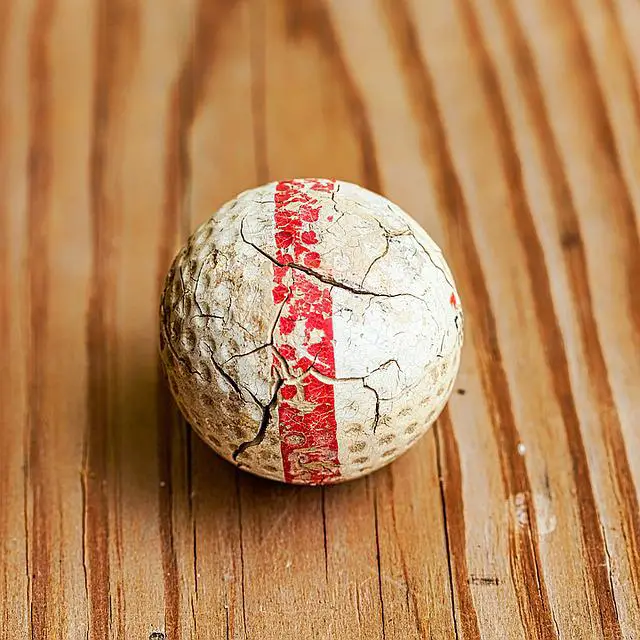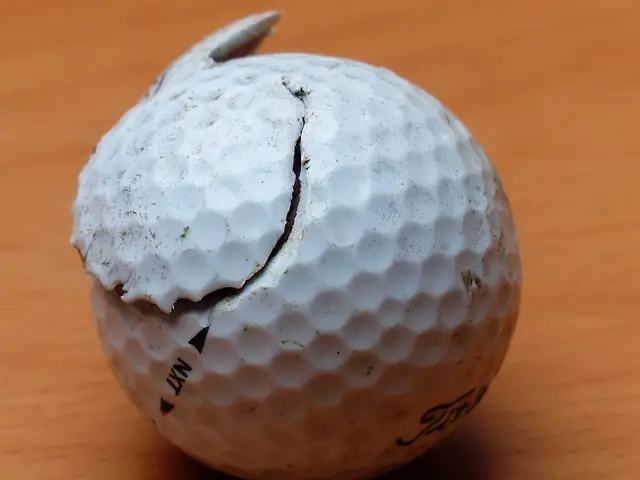Even the best golfers scuff and cut their golf balls on the course. Whether it’s hitting a hard hook off a tree or thinning an iron on to the cart path, golf balls get damaged by all levels of golfers. Regardless of what causes the damage, the important thing to understand is what to do once your ball gets damaged and how it will impact your game.
Does ball damage really impact your ball flight? Not all scuffs and cuts are created equal. Small blemishes will have almost no discernible impact on performance whereas large cuts can make them unplayable. Small scratches on the dimples are immaterial to the ball flight path, but if you see large knicks cut out of the ball you will need to know when and at what point in your round you can swap out balls.
How Scuffed Should My Ball Be Before I Discard It?
Golf is frustrating enough without playing with damaged gear. Scuffed and cut golf balls can impact your ability to score so why ever play with them. On the other hand, golf balls can be expensive. Swapping out golf ball every time there is a blemish would be costly so how do you decide when to discard a damaged golf ball?
This answer depends on the skill level of the golfer. For advanced golfers, small scuffs can make a huge difference. Skilled golfers should check their ball quality regularly to ensure they are maximizing performance in their game.
Newer golfers who struggle to control their golf balls path may not see any noticeable change to their game. It is fine to keep playing with small scuffs as a newer golfer or someone who does not generate high ball speed.

How Much Distance Do You Lose With A Scuffed Golf Ball?
The impact to distance will be directly correlated to the damaged done to the ball and the ball speed of the shot. Small scrapes may lose a yard or two whereas deep cuts will not barely make it off the club face. Same is to be said about the type of shot. The distance impact to your driver vs a wedge shot will be drastically different. Let’s take an example. For an average golfer who can hit their driver 250 yards, small scuffs could lose up to 10+ yards off their driver distance.
Can You Replace A Damaged Golf Ball During Play?
You damaged your golf ball, no what? Can you replace it without penalty, or do you need to play it? Lucky for us, the USGA gives great detail in their rule book.
These rules can become complex given the situational nature of the game. To summarize, you can always change golf balls in between holes regardless of damage. During a hole you can substitute your golf ball when taking relief or if the ball is visibly damaged, if not caused by player abuse.
Can You Repair Damaged Golf Balls?
Ruining a golf ball is never a good feeling. Even buying the cheapest balls can hurt your wallet over time. Those looking to save a few bucks may wonder if there is a way to repair damaged golf balls? The unfortunate answer is no, you cannot fix a damaged golf ball. The cost associated with any potential fix would not be worth the time and effort of fixing. Save your scuffed balls for chipping practice in the backyard, do not try to restore them for your next round on the course.
What To Do With Slightly Damaged Golf Balls?
Golf balls with small scuffs or marks are perfect for practice, especially short game drills. Performance deterioration from scuffs gets lessens as ball speed decreases. Practicing shots that have limited ball speed, such as chipping, are a great way to put slightly scuffed balls to good use. Line up your old, scuffed golf balls in your backyard or the nearest chipping facility then practice, practice, practice. Golf is all about repetition and using your slightly damaged balls for practice around the green is a great way to improve your game.
Can Scuffed Golf Balls Damage Golf Clubs?
If you decide to play with a scuffed ball, you may wonder can this cause any damage to my club? It is very rare for a golf club to get damaged from a golf ball, regardless of if the golf ball itself is new or damaged. Damaged golf balls will mainly affect the feel of the club at impact and the ball flight. There is no need to worry about any damage to your club face.
Final Thoughts
Golf ball damage happens to all golfers, from the seasoned pro to the first timer. What’s important is knowing how a scuffed or cut ball can impact your game. To summarize, it is best to examine your golf ball regularly for damage. If a ball looks like it is no longer playable, don’t take a chance and swap it out. You can always save these blemished golf balls for practice.
Hopefully you liked this article and found it informative. Check out our other blog posts if you liked this one!



3 thoughts on “Do Scuffs Ruin A Golf Ball? (When To Throw Your Golf Ball Away)”